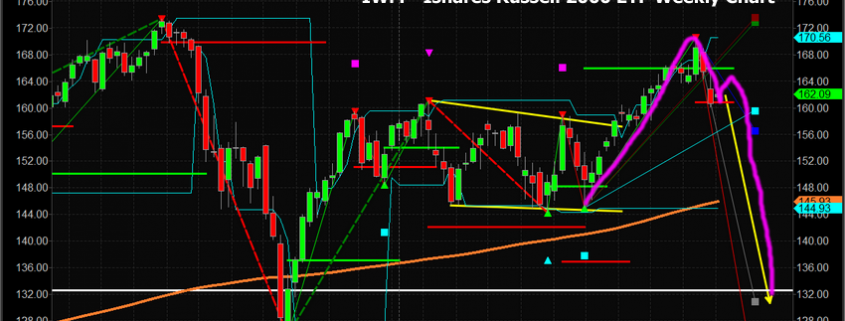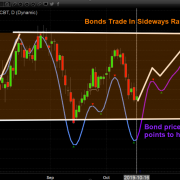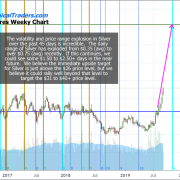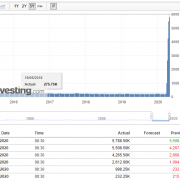Stock Market Sector Rotation Should Peak Within 60+ Days – Part II
The first part of this article highlighted what we believe is the start of a broad market sector rotation setup in the US and global markets. This second part will highlight what we believe are excellent examples of sector trade setups for our friends and followers.
As China continues to pour capital into their markets to stabilize the outflow and fall of asset prices, a number of interesting components of broader sector rotation are setting up. First, the US stock market has rolled lower in what we are calling a “first-tier” of the “waterfall event”.
Additionally, Mid-Caps, Transportation, Energy, and Financials have all started to roll-over of already begun to rotate lower. We believe the contraction in economic activity and global market engagement as a result of the Wuhan virus will result in a much bigger and broader downside price move than many are expecting in the coming weeks.
The death toll for the Coronavirus outbreak reached 910, surpassing the number that died in the 2003 SARS episode. This is causing huge issues with global supply chains and shipping companies as I talked about last week in my HoweStreet Interview.
We believe traders need to be aware of the continued capital shift that has been taking place over the past 4+ years. As foreign markets struggle and the US Dollar continues to strengthen, capital has been moving into the US stock market as a protective measure. We believe this will continue throughout the virus event, yet we believe the US stock market will contract, move lower, as a result of this virus event as well.
Many US companies are still exposed to foreign markets through overseas engagement and retail locations, Automakers, consumer products, manufacturing, heavy equipment and dozens of other sectors derive 5% to 25%+ of their revenues from China and other overseas markets. MacDonalds, Starbucks, Caterpillar and dozens of other US companies have broad exposure in China and Asia. We believe this virus event could last well into July and possibly much longer. Because of this, we believe a broader market sector rotation will take place and that volatility will continue to increase over the next 6 to 12+ months.
Here are the three sectors we believe have a strong potential for setting up a fantastic trade. Follow our research to learn more about what we do and how we can help you find incredible trade setups.
RUSSELL 2000 (IWM) – WEEKLY CHART
The Russell 2000 (IWM) has already started to move a bit lower over the last few weeks. Even though the US stock market was plowing higher throughout most of December and January, the Russell 2000 is actually showing signs of a rounded top formation with a very clear downside “first leg” (waterfall) type of price decline. We believe broader market contraction and sector rotation could push IWM below $144 in an attempt to target historical support near $126.

TECS TECHNOLOGY SECTOR ETF – WEEKLY CHART
The Technology sector may see a broader market decline over the next 30 to 60 days that could push TECS from recent lows, below $6, to levels above $12 to $16 on a reactionary move in this 3x ETF. TECS has experienced very low volatility over the past 3+ months while the US stock market has continued to rally in Q3 and Q4. Any breakdown in the global technology sector could push TECS well above recent peak levels near $18.

XLF FINANCIAL SECTOR ETF – WEEKLY CHART
The Financial Sector is very likely to experience a 3% to 10% decrease in consumer activity related to the lack of travel, outside entertainment, shopping and food services activities and could see extended risk to loans, debts, and other services as a result of a global economic market contraction. We believe a downside risk exists in XLF where the price will likely break below $30 and target the $25 to $26 level over the next 30 to 60+ days. Ultimately, XLF must hold above the December 2018 lows near $22 if the current downside rotation ends within recent price ranges. A move below $22 would indicate we have entered a new stage of a Bear trend.

The reality of the situation for most of us is that we are not at immediate risk of catching anything except a common cold or flu. As skilled traders, we must identify an opportunity where it presents itself and we must attempt to learn to capitalize on that opportunity. We believe these sectors, and many others, are about to present very real trading opportunities for skilled traders.
The virus is expected to double in scope every 6.5 days based on modeling data. Obviously China and Asia are the biggest risks right now. Our biggest concern is that the virus spreads into India and Africa. We believe a spread into these regions could add hundreds of thousands or millions of infected people to the lists. At this point, it is far too early to tell how extended this virus event will become – yet we feel we are just starting this rotation and the true scope of it won’t be known for many weeks or months.
Join us in our quest to create incredible profits from these bigger trends today. As a technical analyst and trader since 1997 I have been through a few bull/bear market cycles, I have a good pulse on the market and timing key turning points for both short-term swing trading and long-term investment capital. The opportunities are massive/life-changing if handled properly.
Join my Swing Trading ETF Wealth Building Newsletter if you like what you read here and ride my coattails as I navigate these financial markets and build wealth while others lose nearly everything they own.
Chris Vermeulen
www.TheTechnicalTraders.com
NOTICE: Our free research does not constitute a trade recommendation or solicitation for our readers to take any action regarding this research. It is provided for educational purposes only. Our research team produces these research articles to share information with our followers/readers in an effort to try to keep you well informed. Visit our web site (www.thetechnicaltraders.com) to learn how to take advantage of our members-only research and trading signals.












